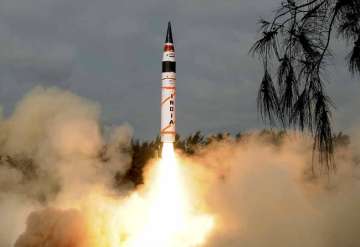India on Thursday joined the exclusive club of countries with intercontinental ballistic missiles (ICBMs) by successfully testing its nuclear capable surface-to-surface ballistic missile Agni-5. It is the most advanced missile in the Agni series with a strike range of over 5000 kms—from a test range off Odisha coast. The user associate test-flight of the missile has further boosted indigenous missile capabilities and deterrence strength of the country.
The sleek missile was test-fired from a canister launcher, mounted on a mobile platform, at about 9.54 am from No. 4 launch pad of the Integrated Test Range (ITR) in Abdul Kalam Island, earlier known as Wheeler Island.
Confirming the development, Defence Minister Nirmala Sitharaman said: “We have successfully launched nuclear-capable ballistic missile Agni-V today.”
Here is all you need to know about India's indigenous nuclear capable surface-to-surface ballistic missile Agni-5
1) Agni-5 or Agni-V is India's first intercontinental nuclear capable surface-to-surface ballistic missile with a range of 5,000 kms.
2) Apart from ICBM agni-5, the Indian armoury of Agni series includes Agni-1 with 700 km range, Agni-2 with 2000 km range, Agni-3 and Agni-4 with 2500 km to more than 3500km range.
3) Agni-5 was first tested on 19 April 2012, next on 15 September 2013, then on 31 January 2015 and latest trial was on 26 December 2016 from the same base.
4) With each update, new technologies are being incorporated into every test in addition to its navigation and guidance system, warhead and engine power.It also has advantages of higher reliability, longer shelf life, less maintenance and enhanced mobility.
5) During today's test, the sophisticated missile travelled for 19 minutes and covered 4,900 km.
6) The missile is so programmed that after reaching the peak of its trajectory it will turn towards Earth to continue its journey towards the intended target with an increased speed due to the attraction of the earth’s gravitational pull.
7) Its path is precisely directed by the advanced on-board computer and inertial navigation system.
8) The first two successful flights of Agni-5 in 2012 and 2013 were in open configuration. The third, fourth and today’s launch from a canister, integrated with a mobile sophisticated launcher, were in its deliverable configuration that enables launch of the missile with a very short preparation time as compared to an open configuration.
9) It also has advantages of higher reliability, longer shelf life, less maintenance and enhanced mobility.
10) Agni-V is about 17-metre long and weighs over 50 tonnes.
(With inputs from PTI)
Latest India News

